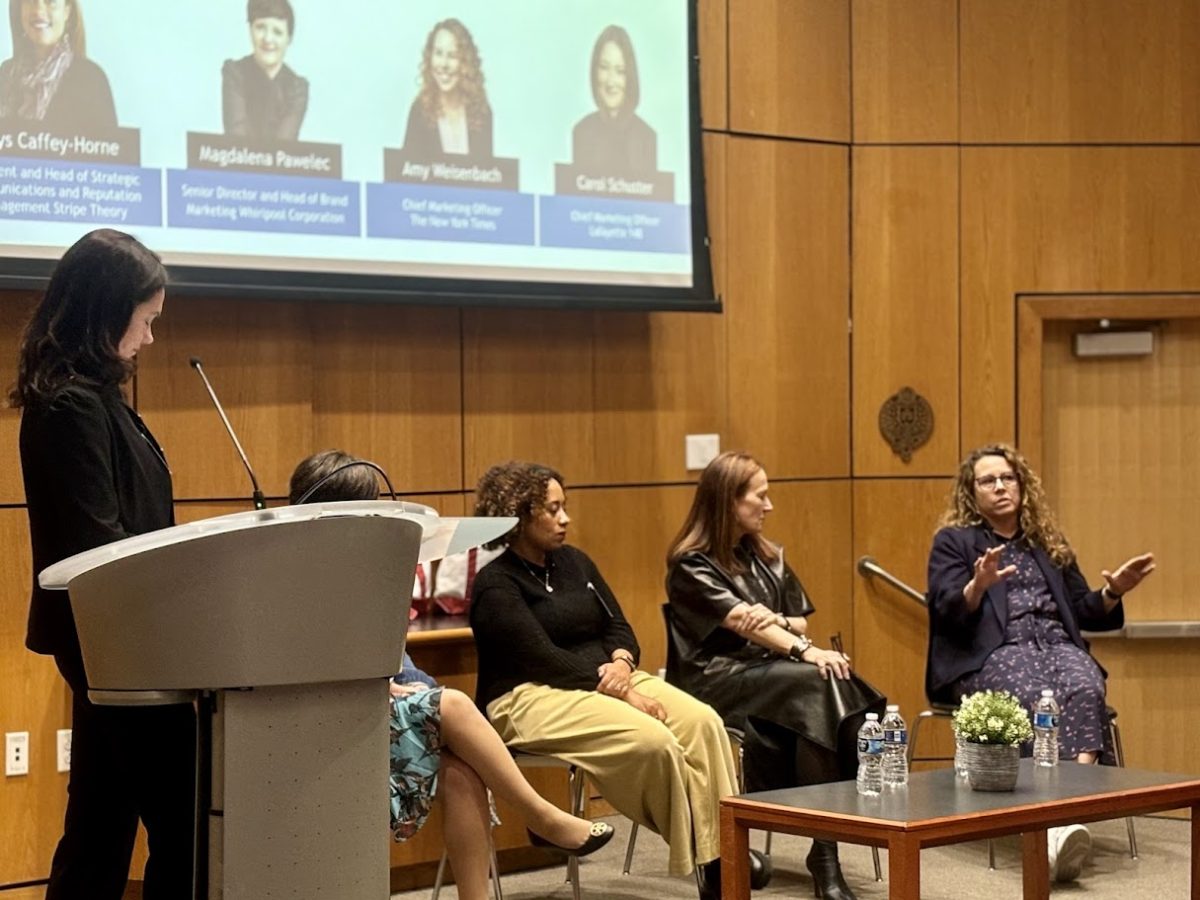Last week, the Gabelli School of Business’ marketing area partnered with the International Advertising Association (IAA) of North America to host “Navigating the Tightrope – Marketing in a Polarized World,” a conference for marketing students and professionals.
The event hosted marketing executives from various corporations, including Amy Weisenbach, chief marketing officer at the New York Times, Magdalena Pawelec, senior director & head of Brand Marketing at Whirlpool Corp., Carol Schuster, chief marketing officer at Lafayette 148 and Isys Caffey-Horne, president and head of Strategic Communications and Reputation at Stripe Theory.
Mohammad Nejad, Ph.D., chair of the marketing area, said the division is seeking to further its connections and industry collaborations.
“We have a deep mission in educating inspiring, ethical and compassionate business leaders who will use the power of business to transform society,” said Dean of the Gabelli School of Business Lerzan Aksoy, Ph.D.
Original research by marketing area faculty members was featured at the event. The members included Nejad, Genevieve O’Connor, Ph.D., associate professor of marketing, Aniko DeLaney, marketing lecturer, and Maria Vittoria Tullio, who received a master’s degree from Gabelli in marketing intelligence in 2024.
“This is an immense source of pride for us, and for me,” said Aksoy. “We are a globally recognized business school, and we have over 2,000 students and over 200 faculty members.”
Thomas Stein, chair of IAA North America, said, “one of the reasons that these [panels] have been a success is because we have had great partnerships with brands and great partnerships with academia.”
The research discussed included 23 interviews with chief marketing officers and top marketing executives between August 2024 and December 2024, as well as over 900 survey responses across four adult generations.
“They [executives] represent a diverse set of different industries,” said Nejad. Some of the research highlights noted by Nejad include social versus political issues, the importance of authenticity and transparency and realistic conversation reaching beyond algorithms.
“We realize there have been a lot of different political conversations, so we are trying here to explore the topic and see what individuals have been thinking about,” said Nejad. The team questioned whether or not individuals believed brands should take a stance on political issues in today’s day and age. A significant percentage across all four generations surveyed, and a conversation with CMOs, showed an agreement that brands should not take a political stance.
Another question was on the importance of brands being authentic. Brands should be transparent and take responsibility, according to those individuals surveyed.
“The pendulum may swing from one side to the other side, but brands must stick to their values,” said Nejad. Brands should have knowledge of their faults and business purposes, and take responsibility when wrongdoing occurs. Also, making proper use of data and not being emotionally reactive is important to brands, said DeLaney.
O’Connor moderated the panel amongst the CMOs present at the event. She began by allowing the panelists to opine on the research findings.
“For me, one of the most interesting findings … is the difference between people who don’t want us to take a stance on political issues but do want us to stand on social issues,” said Caffey-Horne.
“All of us have a desire for brands to be authentic,” said Pawelec. “It’s really critical for brands to win the customers across all of the generations.”
“The common feeling is that everything is on social [media], but more and more of the conversation is happening offline, instead of online,” said Schuster.
“I was really blown away that 90% of people’s grievances with brands–that they don’t post it anywhere,” said Weisenbach.
O’Connor asked the panelists how brands are trying to address the “pendulum swing,” highlighted by Nejad earlier in the event. Caffey-Horne noted how there is a vocal minority, which can lead brands to make decisions not reflective of the needs of their customers or business.
“Navigating some of these issues with the customers can be tricky,” said Schuster. Opening a conversation on voicing political opinions can actually be detrimental to the company’s reputation.
The conversation was pivoted to how these executives feel the best way is to understand the consumer. “You have multiple sources of truth, and the marketers nowadays need to keep their eyes and ears open, 24 hours a day, 7 days a week,” said Pawelec. She stressed the importance of corporations listening to consumers, as well as engaging in store visits.
“We have consumers looking at and reacting to new product features,” Weisenbach said, referencing how she views the qualitative piece of the research findings.
“Our mission is to seek the truth, wherever it leads … and it puts us in a really tricky place with our readers,” she added, remarking how it is important to The New York Times to be independent and recognize its mission.
“We need to think about how to bring the same level of love and engagement to the younger generation, and that includes a slightly different approach … in how we execute the marketing,” said Pawelec.
“I am a huge fan of authenticity, and I think that is what is making brands loved,” said Pawelec. Whirlpool was recently able to move its brand confidence from fourth to first in the dishwasher market, which, to Pawelec, shows the power of caring for the consumer.
Finally, the panelists advised marketers in the room on how to build and preserve brand loyalty.
“Sometimes doing nothing is the right response, and brands often find themselves in crisis mode,” said Schuster. Pawelec echoed that response. “It is important to stay calm, and trust the process,” she said. “Don’t improvise, trust the process, and stay calm.”








































































































































































































